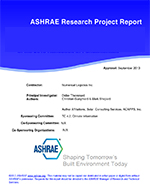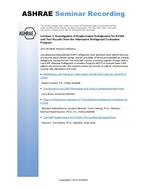Click here to purchase
In cold-climate multi-family (MF) buildings, space and domestic hot water heating often account for over half of total building energy use. Reducing theenergy use of these systems can reduce GHG emissions as well as operational energy costs. Literature suggests that boiler equipment tends to operate atlower efficiencies when demand is low compared to the boiler capacity, however, investigation into this phenomenon has been limited in high-rise MF buildings,particularly in the Canadian context. This paper expands on previous work by the authors to characterize central heating plant performance in MFbuildings. Building Automation System (BAS) data from four Ontario MF buildings are used to develop natural gas consumption, boiler utilizationfactors, and cycle length profiles. Longer cycle lengths were observed in the MF Buildings with smaller, single- or two-stage boilers (ranging from 37 minutesin the summer to 535 minutes in the winter) as compared to the MF Buildings with larger, fully modulating boilers, which typically had cycle lengths of 20to 30 minutes. An analysis of space heating system efficiency in the buildings revealed annual system efficiencies between 41% and 47%, significantly belowthe boiler nameplate efficiencies of 80% and above. The large, fully modulating boilers installed in two of the buildings did not offer improved performanceover the smaller, single- or two-stage boilers installed in the other buildings – each system demonstrated reduced efficiency at low building demands.
Citation: 2020 Winter Conference, Orlando, FL Conference Papers
Product Details
- Published:
- 2020
- Number of Pages:
- 9
- Units of Measure:
- Dual
- File Size:
- 1 file , 2.2 MB
- Product Code(s):
- D-OR-20-C039


